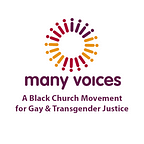Is a NYC gay bar excluding black patrons?
Few stories are as ubiquitous within LGBTQ communities as reports of anti-black discrimination within gay bars and nightclubs. This story is retold once again amidst controversy about the alleged practices of REBAR, a newly opened bar in New York City’s Chelsea neighborhood.
Accusations and rebuttals are flying over whether REBAR, a newly opened gay bar on 19th Street in New York City’s Chelsea neighborhood discriminates against some black patrons. The controversy gives us an opportunity to reflect on the complexity of racial and economic bias within gay male communities.
Some Black patrons have documented incidents whereby doormen are allegedly telling Black patrons waiting in a queue outside of the bar, that the space is “at capacity” when, in fact, it may have scant visitors inside, as Edugaytion reported. Others charge that the bar’s advertising (like the image that accompanies this article) excludes Black people, signaling the management’s biases.
In a Facebook thread quoted in the Edugaytion article, a man identifying himself as Alex Arevalo, an alleged employee at the establishment, counters those who accuse REBAR of racism. He contends that the bar’s management can’t be racist because it employs Black bartenders, disc jockeys, and doormen.
Arevalo also insists that he is himself Latinx. Arevalo does not address some Black patron’s charges of being excluded from the premises or the apparent whites-only branding within the bar’s advertising. Moreover, online commenters have pointed out that Latinx people hail from many cultures, and many identify as white, or align with white people.
Of course, for centuries (literally) bars and nightclubs across the United States employed Blacks while excluding most Black patrons. These practices reached their zenith during the Jim Crow era, and gay bars and nightclubs were not immune from the bigotries. Don Romesburg provides an indispensable historical overview of racism within the white gay-owned businesses within San Francisco’s Castro neighborhood. Last year, protesters rallied against Philadelphia’s ICandy nightclub after video surfaced of its white gay owner denigrating Black patrons and calling them the “n-word.”
Rebar has yet to issue an official statement regarding its non-discrimination policy and its commitment to welcoming patrons of all cultures and creeds. However, indications of the bar’s aesthetic can be discerned from reports and interviews with Facundo Rodriguez, one of REBAR’s management team, prior to the establishment’s opening this month.
These articles about REBAR’s opening reveal a tension between the ostensibly private tastes of businessmen and the public interests of an inclusive LGBTQ community.
Last month, Kenneth Walsh reported on the bar’s plans for opening in April 2017, writing that, “a team of guys that includes Facundo Rodriguez will be opening a new night spot called REBAR in the space G Lounge occupied for 20 years on 19th Street in Chelsea.”
“We’re recreating the neighborhood bar where the focus is on personal interaction. We’re taking away all the distractions: no TVs, no shows, no go-gos and focusing on our staff as the entertainment. They are all eclectic, something sexy for everyone. They all have great personalities and they are all expert bartenders who will serve up delicious drinks from our specialty menu,” says Facundo Rodriguez, who hails from Argentina, in an interview for Get Out! Magazine.
Certainly, elevating “personal interactions” seems like a welcome benefit. But, what happens when someone’s cultural difference may seem to preclude personal interaction? What happens in this queer space when the bar’s staff deems a would-be patron unworthy of their commitment to no-frills personal interaction?
In this pared down social space where intimate rapport supposedly reigns, how can people of different creeds interact when there is a well-spoken assumption of narrow, highly localized, closed interactions? After all, that is what many “neighborhood bars” may be known for—rather than opening their arms to everyone, they operate as cloaked closed spaces, subtly closing ranks so “everybody knows your name,” as the adage goes. These are the questions and reflections haunting Rodriquez’s statements about the bar’s aesthetic.
While Rodriquez says that his bar’s staff is “eclectic,” REBAR’s advertising emphasizes a hyper-masculine aesthetic with white men (or seemingly white Latino men) posing in mock workmen’s clothes amid a fantasy version of a construction site.
An inclusive revision to the advertising would add several visibly dark skinned Black men and transgender men to convey that everyone can enjoy this hyper-masculinized fantasy. It’s not the fantasy that is a problem. It’s the exclusion.
Rodriguez’s interview for Get Out! highlights his gym routine, his interest in acting, and his commitment to working out and includes several photographs of himself that emphasize his migration from Argentina to Miami and New York City.
Insofar as they can be gleaned from his statements in his interview, Rodriquez tastes should be applauded—they engender a sense of pride and they speak to his accomplishments as an immigrant to the United States.
In Rodriquez’s interview, REBAR is touted as “a new destination for men in gay nightlife.” But, are we talking about all men regardless of their culture, color, and gender expression?
Cultural establishments like REBAR express their aesthetic through their branding, staffing, and business practices. Does REBAR have a right to narrow its tastes towards, presumedly upwardly mobile, mostly white (and white Latinx) men with a hyper-masculinized expression of gender?
If REBAR classifies itself legally as a private, members-only club by law and does not advertise to the broader public as a generalized space for “gay nightlife,” then it may enjoy a right to narrow its purview and restrict its membership.
But, if it purports to be a gay space for the community, then the bar’s management has a legal and a moral obligation not to discriminate, and while announcing its aesthetic as a masculinized gay male fantasy, its “capacity” must welcome everyone regardless of color, class, and creed without subtle or overt recriminations. That’s what justice is all about!
